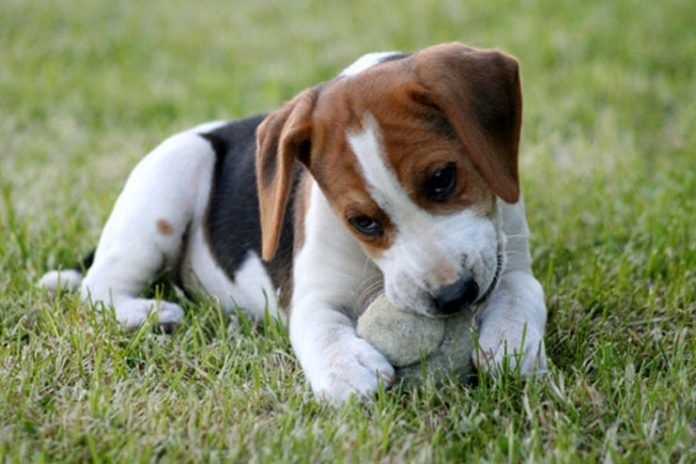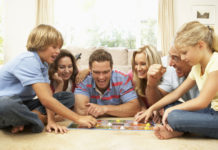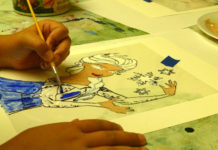We were running late, as usual. No one was dressed yet, the beds weren’t made, and I kept tripping over the dog while
I crisscrossed the kitchen, trying to cook breakfast and pack three lunches at once.
“Bed, Scout,” I said crossly, pointing the dog to her space in the family room. When 8-year-old Sam climbed up on the
counter to get to the cereal cabinet, I shooed him away too. “Wait, honey. The oatmeal’s almost ready.”
“Mom, I’m starving,” he wailed. “Can’t I just get myself some cereal?”
So I wasn’t exactly thrilled when, five minutes later, I plunked down three bowls of oatmeal and starving Sam wasn’t
at the table. His two little brothers dutifully dug in, but Sam was headed out the door, skipping and giggling while
Scout bounded alongside him.
“Sam!” I ordered. “You get in here right this minute and eat your oatmeal!”
He stopped, turned, and looked at me in astonishment. “But Mom, Scout’s hungry too. It would be cruel to eat in front
of her when she hasn’t had breakfast herself.”
And it dawned on me that Scout is far more than just another beloved creature in my house who needs something from me.
Scout is one of the chief reasons my sons are becoming good human beings: She’s teaching them empathy, compassion,
and responsibility. She’s teaching them what it means to put another’s needs before their own. And in a world of
report-card grades and ball-game scores and bad-behavior time-outs (and, it must be admitted, stressed-out mothers),
her unconditional love is teaching my children that they’re real heroes,no matter what. {C}
Benefits of the Bond
Almost 60 percent of American households have pets (with dogs just edging out cats), even though a pet can be a
significant investment of both time and money. But the benefits to children — to the whole family, really — far
outweigh the costs.
Pets keep kids healthy “The scientific proof is building on the living-room logic that pets not only make us feel good,
they’re good for us,” says veterinarian Marty Becker, D.V.M., author of Chicken Soup for the Pet Lover’s Soul.
Recent studies in Europe and the United States have found that infants who share a home with at least one pet are
significantly less likely to develop allergies to animals, dust mites, grasses, and pollens later in childhood.
Pet owners also tend to be less anxious and have lower blood pressure than folks who don’t have an animal in the house.
Pets often rate as a sort of furry form of Prozac too: “They can provide social support that helps people to be more
impervious to anxiety-provoking situations,” says psychologist Kimberly Sirl, Ph.D., of the St. Louis Children’s Hospital.
This is especially true for children, who tend to see pets — even fish — as family members. They give kids a way to
cope with the normal stresses of growing up — the birthday parties they’re excluded from, the lost soccer games
— as well as more disruptive events like the death of a grandparent or divorce. “Children may find it easier to tell a
pet their feelings,” says Sirl.
Pets improve kids’ self-esteem The way many dogs and cats (and, lots of kids would argue, guinea pigs) love children
is unconditional, which can help kids to develop healthy self-esteem. “No matter what sort of day we’ve had, pets love
us just the same,” says Dr. Becker.
Self-esteem also grows out of a sense of accomplishment. When a child feeds a pet, takes it for a walk, or simply scratches
it behind the ears, the positive feedback is both instant and obvious. A wagging tail or a satisfied purr is all it takes
for a child to know that she’s done a good job.
Pets give kids social confidence Children who tend to be shy, sensitive, or withdrawn may find it easier to open up to an
animal than to another person, which can help them build the confidence they need to develop human relationships.
A bashful child with a dog on a leash or a kitten on the front porch may also find that other kids are attracted to the
animal, giving the child an easy way to engage with others.
Pets teach kids how to care Children tend to respond to a pet’s unconditional love with unconditional love of their own.
In fact, relationships with pets are very simple compared to those with family and friends, says Sirl. A sibling can be
a nuisance, a friend can be fickle, parents can be insufferably bossy — but an animal inspires only mutual love.
A little boy who’s trying hard to become a big boy may feel awkward giving a friend a hug, but he can go home and nuzzle
his dog or his cat without feeling self-conscious.









